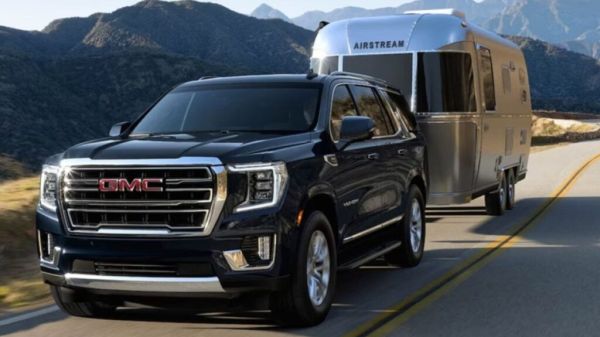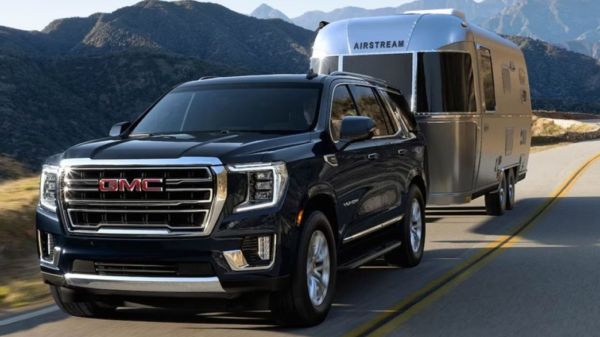While SUVs may not be the best vehicles for maximum towing capacity, they can tow a camper. Of course, towing a gooseneck or 5th-wheel with an SUV is out of the question as the hitches for those types of campers fit in the bed of a pickup truck. This leaves popular camper styles such as teardrop trailers, A-Frames Campers, Pop-Up Campers, and Travel Trailers, including some bumper pull Toy Haulers. The key to safely towing a camper (or any trailer) with an SUV (or any vehicle) is to never exceed the automaker’s weight ratings.
Every SUV has two weight ratings you’ll want to keep in mind when deciding to tow a camper. One is the GVWR, short for Gross Vehicle Weight Rating, often found on the driver’s side door or door pillar. This is the maximum allowable weight of the vehicle when it’s fully loaded with fuel, passengers, and cargo. The other is the Gross Combined Weight Rating, or GCWR, which adds the allowable trailer weight to the vehicle’s GVWR.
Does the camper’s weight matter?
An SUV’s GVWR and GCWR tie in directly to its payload and towing capacity, but automakers typically provide the vehicles maximum payload and towing capacities eliminating the need for doing some of the required calculations. When considering whether or not to tow a camper with an SUV there are three weights from the camper to consider, but it’s not necessarily an exact science unless you take the time to weigh the entire rig a few different ways.
Somewhere on every modern camper is a sticker with the camper’s Hitch Weight, Dry Weight, and GVWR, in this case the maximum weight of the camper and its contents. This is where things get a little murky because the manufacturer of the camper cannot foresee how someone might load the camper. This means that the hitch weight on the sticker is calculated for the dry, or unloaded, camper. The actual hitch weight, which is included in the SUV’s payload when towing, changes depending on how the required camping gear and onboard fresh and waste water tanks are loaded in the camper.
Ideally, hitch weight, or trailer tongue weight, should equal 10% to 15% of the total loaded camper weight. Putting too much weight toward the front of the camper can unnecessarily overload the SUV’s payload. However, putting too much weight at the rear of the camper can lead to a dangerous condition known as Trailer Sway that can cause a rapid loss of vehicle control.
Making sense of all the numbers associated with towing a camper
Let’s use the GMC Yukon, one of the largest full-size SUVs you can buy, as an example for crunching the numbers to determine a safe upper weight limit for towing a camper. According to GMC, the 2025 Yukon Elevation equipped with the 5.3L EcoTec3 V8 and limited-slip differential rear-wheel drive has a maximum tow rating of 7,700 pounds and a maximum payload of 2,070 pounds.
We’ll have to consider that a loaded camper weighing 7,700 pounds should have between 770 and 1,155 of hitch weight that will be carried by the SUV and counted as payload. The only way to know the exact weight of the trailer at the hitch is to weigh it on a scale such as a Cat scale typically found at truck stops. So, for safety’s sake we’ll have to use 1,155 pounds of hitch weight until the camper can be weighed. That leaves 915 pounds of cargo capacity for fuel, gear, and passengers, a figure that is cause for concern with a vehicle that seats eight.
There are a wide variety of campers that fall well below the Yukon’s maximum tow rating. One example is the 2025 Airstream Bambi 16RB with a maximum loaded weight of 3,500 pounds. Fully loaded the 16RB should have a hitch weight under 525 pounds, leaving plenty of cargo capacity for the Yukon. It could also be towed by smaller SUVs with ease.









